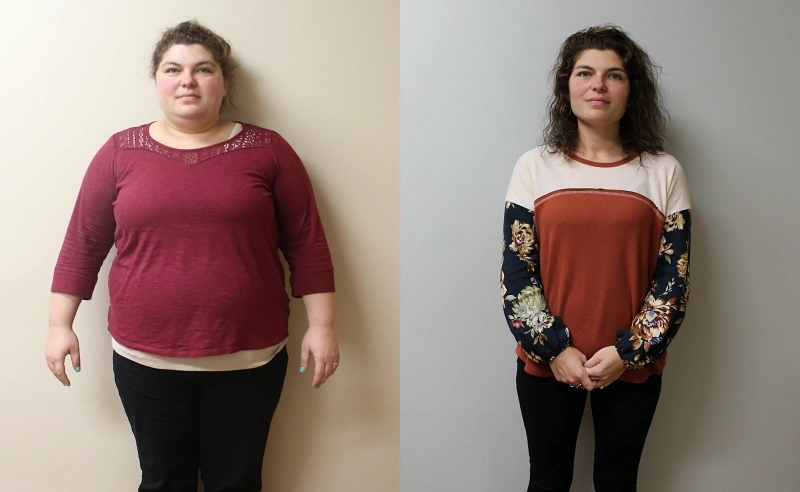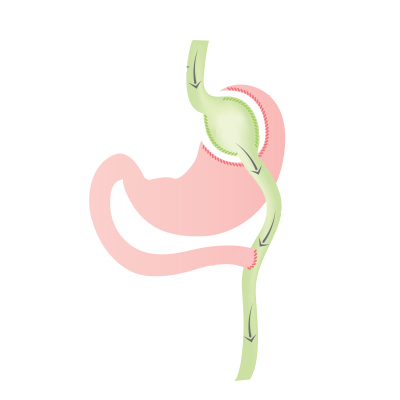At St. Louis Bariatrics, we recognize the dedication it takes to achieve lasting weight loss, and we’re here to provide effective solutions when diet and exercise alone aren’t enough. Led by Dr. Jay Michael Snow, our compassionate team offers gastric bypass surgery as a proven option for individuals in St. Louis, MO, seeking to improve their health and reach their weight loss goals. With a personalized approach and ongoing support, we’ve helped countless patients transform their lives, empowering them to enjoy a healthier, more active, and rewarding lifestyle.
- What is Gastric Bypass Surgery?
- Benefits of Weight Loss Surgery
- Who is a Candidate for Gastric Bypass Surgery?
- Preparing for Gastric Bypass Surgery
- The Gastric Bypass Procedure
- Recovery After Gastric Bypass
- Gastric Bypass Results
- Plan Your Gastric Bypass Procedure
- How Much Does Gastric Bypass Surgery Cost?
- FAQs About Gastric Bypass
What is Gastric Bypass Surgery?
Gastric bypass surgery, often referred to as Roux-en-Y gastric bypass, is a highly effective weight loss procedure widely used in the treatment of obesity. This laparoscopic surgery involves reshaping the digestive system to help patients reduce caloric intake and improve overall health. During the procedure, a small stomach pouch is created and connected directly to the small intestine, bypassing a significant portion of the stomach and the first part of the small intestine. This rerouting limits food intake and alters nutrient absorption, providing a dual approach to weight loss.1
Benefits of Weight Loss Surgery
Gastric bypass surgery offers profound health and quality-of-life benefits for those facing obesity and related health conditions. This life-changing procedure can provide sustainable weight loss by reducing appetite and limiting calorie absorption, along with the following documented advantages:
Significant Weight Loss
Patients who undergo gastric bypass can achieve substantial weight loss in a relatively short period, setting the foundation for long-term health.
Reduction in Cravings
Many patients experience a decrease in ghrelin, the “hunger hormone,” which can help manage cravings, hunger, and blood sugar levels.2
Type 2 Diabetes Remission
Approximately 72% of patients see remission or improvement in Type 2 diabetes after surgery, with some studies noting up to 80% achieving full remission.3
Sleep Apnea Resolution
For those with sleep apnea, 78% experience a complete resolution of symptoms following gastric bypass surgery.4
Lower Blood Pressure
Nearly 51% of patients see remission of high blood pressure, contributing to better heart health and reduced cardiovascular risk.5
Faster Recovery
As a minimally invasive laparoscopic procedure, gastric bypass generally results in shorter hospital stays, smaller scars, and a quicker recovery than open surgery.
Enhanced Quality of Life
The majority of patients report improved quality of life, including increased energy, mobility, and overall well-being.6
St. Louis Bariatrics is committed to helping patients achieve these benefits, providing a supportive environment to help you reach your health and lifestyle goals.
Patient Results

Patient Name: Heather
Who is a Candidate for Gastric Bypass Surgery?
Gastric bypass surgery may be an ideal option for individuals who have struggled to achieve lasting weight loss through traditional methods and are ready to commit to a healthier lifestyle. At St. Louis Bariatrics, candidates typically include those with:
- A Body Mass Index (BMI) of 35 or Higher: Individuals with a BMI of 35 or above, especially those with weight-related health concerns, may be considered for gastric bypass.
- Related Health Conditions: For those with a BMI between 30 and 35, the presence of conditions such as Type 2 diabetes, high blood pressure, sleep apnea, or heart disease can further support the need for surgery.
Alongside gastric bypass, St. Louis Bariatrics also offers other weight loss options, including sleeve gastrectomy (gastric sleeve) and personalized medical weight loss plans. To determine if gastric bypass is right for you, scheduling a consultation with our team is the first step toward a healthier, more active life.
Preparing for Gastric Bypass Surgery
Preparing for gastric bypass surgery at St. Louis Bariatrics begins with a personalized consultation. During this initial appointment, our care team will take the time to understand your health goals and review your medical history to determine if gastric bypass is the right path for you. You’ll have the opportunity to ask questions, share your concerns, and learn about various treatment options and bariatric procedures in our weight loss program.
If gastric bypass is confirmed as the ideal choice, we’ll guide you through essential preparation steps, including a pre-surgical diet designed to optimize your health before surgery. You’ll also receive details about the procedure, recovery expectations, and lifestyle changes that will support your weight loss journey. At St. Louis Bariatrics, we are here to help you start on the path to better health with the information and support you need for success.
The Gastric Bypass Procedure
Gastric bypass is performed as a minimally invasive, laparoscopic surgery under general anesthesia, typically requiring a hospital stay of one to two nights. During the procedure, Dr. Snow begins by creating a small stomach pouch, about the size of an egg, to limit food intake. This smaller pouch is then connected to the middle section of the small intestine, bypassing the main stomach and the initial portion of the intestine where much of digestion and calorie absorption occurs.
By altering both the size of the stomach and the digestive pathway, gastric bypass helps patients feel full after eating smaller portions and reduces the absorption of calories and nutrients. The procedure generally takes around 2.5 hours and involves several small incisions, which aid in quicker recovery and minimal scarring. Following surgery, patients will need to adhere to a specific diet and take supplements to maintain proper nutrition.
Recovery After Gastric Bypass
Recovery after gastric bypass surgery generally takes about two weeks, during which patients are advised to rest and gradually increase activity. According to the American Society for Metabolic and Bariatric Surgery (ASMBS), many patients are able to return to light activities or work within one to two weeks, although strenuous activity should be avoided for several more weeks.7 During this time, it’s essential to stay hydrated by drinking at least 64 ounces of fluids daily, which helps prevent nausea, constipation, and fatigue.
Patients will follow a carefully structured diet plan beginning with liquids, then moving to soft foods, and eventually incorporating solid foods. Long-term, a balanced diet with adequate protein and supplementation of calcium, iron, vitamin B12, and a multivitamin is recommended to support health and compensate for reduced nutrient absorption. Dr. Snow and the St. Louis Bariatrics team will provide guidance throughout the recovery process to help you successfully adjust to these new habits and achieve your health goals.
Gastric Bypass Results
Gastric bypass surgery is an effective tool for significant weight loss, with patients typically losing up to 70% of their excess body weight within the first two years.8 This substantial weight loss, combined with lifestyle changes, can lead to improvement or even remission of various obesity-related health conditions. Many patients experience benefits such as:
- Remission of Type 2 Diabetes
- Reduced High Blood Pressure
- Lower Cholesterol Levels
- Resolved Sleep Apnea
In addition to these health improvements, patients often enjoy enhanced self-esteem, increased mobility, and an overall boost in quality of life. At St. Louis Bariatrics, we provide comprehensive support to help you maintain these life-changing results.
Plan Your Gastric Bypass Procedure
- Covered by Insurance: Yes
- Financing Available: Yes
- Average Self-Pay Cost*: $23,500
- Minimally Invasive: Yes
- Non-Surgical: No
- Average Procedure Time: 2.5 hours
- Typical Hospital Stay: 1 to 2 nights
- Typical Recovery Time: 7 to 10 days
*Prices are subject to change.
How Much Does Gastric Bypass Surgery Cost?
$23,500 Self-Pay Pricing
At St. Louis Bariatrics, we prioritize transparency and strive to offer competitive pricing for gastric sleeve surgery. Achieving good health is one of the most meaningful gifts you can give yourself and your loved ones, and we are dedicated to supporting patients in reaching their weight loss goals for a healthier, more fulfilling life. For those without insurance coverage for weight loss surgery—or those who prefer to avoid insurance-related delays—we offer self-pay pricing options for the gastric sleeve procedure.
Our self-pay price of $23,500 for gastric bypass surgery includes*:
- Facility Center Fee
- Surgeon Fee
- Surgical Assistant Fee
- Anesthesiologist Fee
- Postoperative Follow Up Appointments with Dr. Snow
- Post-operative Follow Up with Licensed Dietitian
- sFMLA Paperwork Completion
Beyond the numerous health advantages, weight loss surgery can also help patients reduce long-term medical and healthcare expenses. Don’t let insurance challenges stand in the way of a healthier future. Visit our payment options page to explore financing solutions and possible tax benefits for weight loss procedures. Reach out to us today for more details or to book a consultation.
*Additional minor fees may apply depending upon medical history and needs.
FAQs About Gastric Bypass
How much weight can I expect to lose after gastric bypass?
Weight loss results vary for each individual, but gastric bypass surgery is known to be highly effective for significant weight reduction in a relatively short period. On average, patients lose as much as two-thirds of their excess weight within the first year.9 Weight loss typically continues at a slower rate into the second year.
How does gastric bypass compare to other bariatric surgery procedures like gastric sleeve and gastric banding?
Gastric bypass is a well-established procedure for significant weight loss and works by creating a smaller stomach pouch and rerouting a portion of the digestive tract to limit calorie absorption. Unlike gastric sleeve surgery, which involves permanently removing a portion of the stomach to reduce hunger hormones and restrict food intake, gastric bypass also modifies nutrient absorption, leading to a dual approach to weight loss.
Gastric banding, or LAP-Band surgery, differs from both gastric bypass and gastric sleeve as it involves placing an adjustable band around the upper portion of the stomach to limit food intake. While gastric banding is less invasive and reversible, it generally results in slower weight loss and may require ongoing adjustments. Gastric bypass is often recommended for patients seeking rapid, sustained weight loss and metabolic benefits, though the choice depends on individual health goals and needs.
Is gastric bypass surgery reversible?
Gastric bypass is generally considered a permanent procedure due to the anatomical changes made to the digestive system, making it irreversible in most cases.
Will I need to take supplements after my gastric bypass surgery?
Yes, because gastric bypass reduces your body’s ability to absorb nutrients from food, you will need to take daily vitamins and supplements to maintain your nutrition. It’s also recommended to have annual blood tests to monitor vitamin and nutrient levels.
Is gastric bypass surgery covered by insurance?
For many patients, gastric bypass is seen as medically necessary, which often means insurance coverage is available. At St. Louis Bariatrics, we specialize in navigating insurance requirements and can help you understand potential out-of-pocket expenses. We also offer self-pay and financing options if needed.
What are the risks associated with gastric bypass surgery?
While gastric bypass is generally safe when performed by an experienced bariatric surgeon, all surgeries carry potential risks. Possible complications include infection, bleeding, blood clots, dumping syndrome, gastrointestinal leakage, internal hernia, bowel obstruction, respiratory issues, and, in some cases, vitamin deficiencies or weight regain.10 Working with an experienced surgeon can help reduce these risks and increase confidence in your surgical outcomes.
Where Do I Go From Here?
you’re struggling with obesity and related conditions such as Type 2 diabetes, you don’t have to face these challenges alone. Dr. Snow is an experienced and compassionate bariatric surgeon who has helped many patients start living the healthy, active life that they deserve. The first step is scheduling a consultation with Dr. Snow, who will walk you through your treatment options and help you make the best decision for you.
References:
1 UCLA Health. Gastric Bypass Surgery. Available: http://surgery.ucla.edu/bariatrics-gastric-bypass. Accessed October 30, 2024.
2 Benaiges D, Más-Lorenzo A, Goday A, Ramon JM, Chillarón JJ, Pedro-Botet J, Flores-Le Roux JA. Laparoscopic sleeve gastrectomy: More than a restrictive bariatric surgery procedure? World J Gastroenterol. 2015 Nov 7;21(41):11804-14. doi: 10.3748/wjg.v21.i41.11804. PMID: 26557004; PMCID: PMC4631978. Available: https://pubmed.ncbi.nlm.nih.gov/26557004/. Accessed October 30, 2024
3 Pournaras DJ, Osborne A, Hawkins SC, Vincent RP, Mahon D, Ewings P, Ghatei MA, Bloom SR, Welbourn R, le Roux CW. Remission of type 2 diabetes after gastric bypass and banding: mechanisms and 2 year outcomes. Ann Surg. 2010 Dec;252(6):966-71. doi: 10.1097/SLA.0b013e3181efc49a. PMID: 21107106. Available: https://pubmed.ncbi.nlm.nih.gov/21107106/. Accessed October 30, 2024.
4 Peromaa-Haavisto P, Tuomilehto H, Kössi J, Virtanen J, Luostarinen M, Pihlajamäki J, Käkelä P, Victorzon M. Obstructive sleep apnea: the effect of bariatric surgery after 12 months. A prospective multicenter trial. Sleep Med. 2017 Jul;35:85-90. doi: 10.1016/j.sleep.2016.12.017. Epub 2017 Jan 12. PMID: 28549834. Available: https://pubmed.ncbi.nlm.nih.gov/28549834/. Accessed October 30, 2024.
5 Schiavon CA, Bersch-Ferreira AC, Santucci EV, et al. Effects of Bariatric Surgery in Obese Patients With Hypertension: The GATEWAY Randomized Trial (Gastric Bypass to Treat Obese Patients With Steady Hypertension) [published correction appears in Circulation. 2019 Oct;140(14):e718]. Circulation. 2018;137(11):1132-1142. doi:10.1161/CIRCULATIONAHA.117.032130. Available: https://www.ncbi.nlm.nih.gov/pmc/articles/PMC5865494/. Accessed October 30, 2024.
6Major P, Matłok M, Pędziwiatr M, et al. Quality of Life After Bariatric Surgery. Obes Surg. 2015;25(9):1703-1710. doi:10.1007/s11695-015-1601-2. Available: https://www.ncbi.nlm.nih.gov/pmc/articles/PMC4522031/#. Accessed October 30, 2024.
7 ASMBS. Life After Bariatric Surgery. Available: https://asmbs.org/patients/life-after-bariatric-surgery. Accessed October 31, 2024.
8 American Academy of Family Physicians. Treatment of Adult Obesity with Bariatric Surgery. Available:https://www.aafp.org/pubs/afp/issues/2016/0101/p31.html. Accessed October 31, 2024.
9 Columbia University Irving Medical Center. Gastric Bypass Surgery. Available: https://columbiasurgery.org/conditions-and-treatments/gastric-bypass-surgery. Accessed October 31, 2024.
10Mayo Clinic. Gastric Bypass. Available: https://www.mayoclinic.org/tests-procedures/gastric-bypass-surgery/about/pac-20385189. Accessed October 31, 2024.
Dr. Jay Snow has either authored or reviewed and approved this content.






